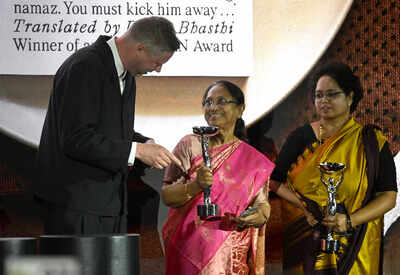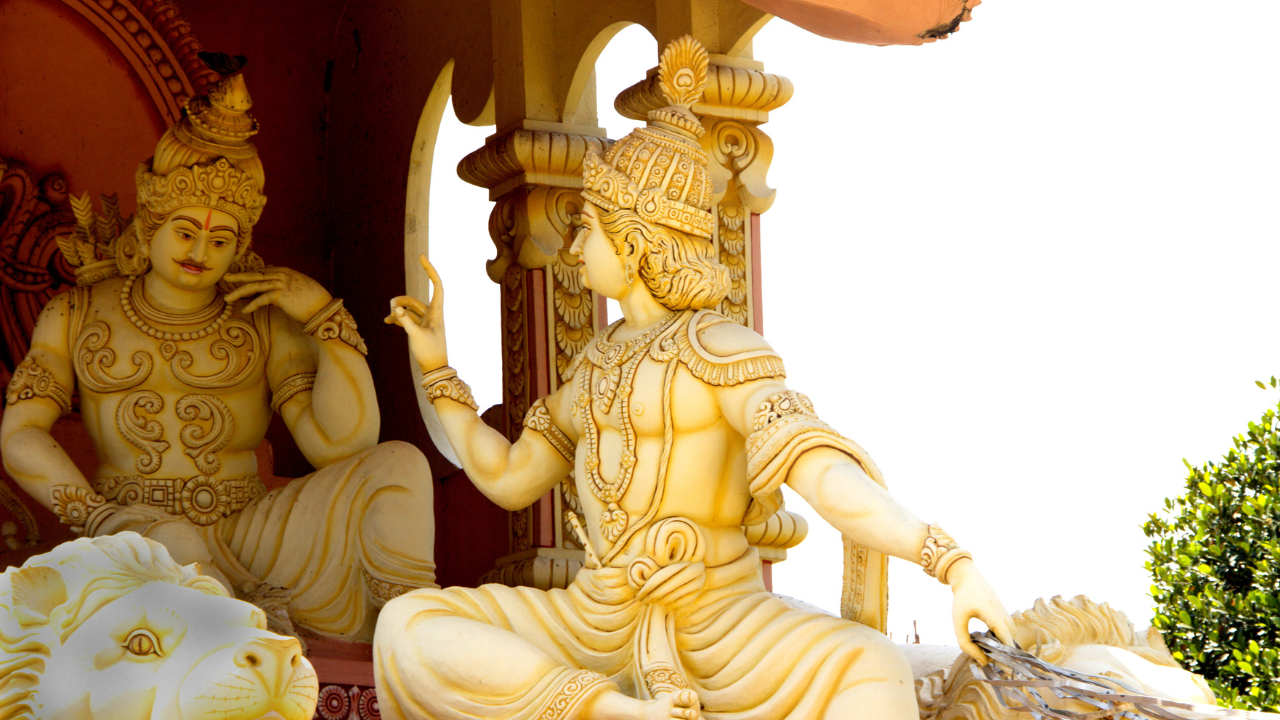
LONDON, ENGLAND - MAY 20: Chair of Judges Max Porter (L) with Banu Mushtaq, author of "Heart Lamp", (C) and Deepa Bhasthi, translator, winners of The International Booker Prize 2025 onstage at the Tate Modern on May 20, 2025 in London, England. (Photo by Kate Green/Getty Images)
For the very first time, a woman who wrote in Kannada has risen to the ranks of the International Booker Prize, making her book the first Kannada to English translation to win one of the most coveted literary awards.The woman we are talking about is Banu Mushtaq, who won the International Booker Prize recently for her short story collection ‘Heart Lamp’, and this win also belongs to Deepa Bhasthi, the translator, who brought the piece to a wider audience by translating it into English.Mushtaq was not a household name in India, and her fame was limited to the select few who followed her works as a lawyer and activist. But her recent accolade has nothing to do with courtrooms or legal proceedings, but rather literature.
Banu Mushtaq’s early life
Banu Mushtaq is a woman who dons many hats. She is a lawyer, writer, activist, poet, and more, and hails from Karnataka, India.It is said that Mushtaq started to learn and write in Kannada at 8 years of age, before which she was not proficient in the language, but went on to become one of the most celebrated Kannada writers. Her love and resolve for social justice, language, and literature will now be praised forever. Mushtaq has been famous in regional literary circles, writing on themes like gender, identity, injustice, and the inner emotional landscape of ordinary people, especially women, and her style is often described as simple, raw, and deeply heartfelt.
The win
The International Booker Prize is awarded each year to a book that has been translated into English and published in the UK or Ireland. It focuses on the art of translation and how well the English version complements the regional language one, making sure that its essence is not lost in translation.
How was the book described?
According to the Booker Prize website, Max Porter, the Chair of Judges, remarked about the book, “‘Heart Lamp is something genuinely new for English readers.
A radical translation which ruffles language, to create new textures in a plurality of Englishes. It challenges and expands our understanding of translation. ‘These beautiful, busy, life-affirming stories rise from Kannada, interspersed with the extraordinary socio-political richness of other languages and dialects. It speaks of women’s lives, reproductive rights, faith, caste, power and oppression. ‘This was the book the judges really loved, right from our first reading.
It’s been a joy to listen to the evolving appreciation of these stories from the different perspectives of the jury. We are thrilled to share this timely and exciting winner of the International Booker Prize 2025 with readers around the world.’”
Banu Mushtaq on her book
When the Booker Prize team talked to Banu Mushtaq about her work, her influences, her love for literature, and how her work is shaped, about her book she said “My stories are about women – how religion, society, and politics demand unquestioning obedience from them, and in doing so, inflict inhumane cruelty upon them, turning them into mere subordinates.
The daily incidents reported in media and the personal experiences I have endured have been my inspiration.
The pain, suffering, and helpless lives of these women create a deep emotional response within me, compelling me to write.Stories for the Heart Lamp collection were chosen from around 50 stories in six story collections I wrote between 1990 and later. Usually, there will be a single draft, and the second one will be a final copy.
I do not engage in extensive research; my heart itself is my field of study. The more intensely the incidence affects me, the more deeply and emotionally I write.” And when we ask people about one book that completely changed them and influenced their way of thought, everyone names a book they hold close to their mind and heart. But Mushtaq said “No single book has dictated my life and writing. Instead, numerous books and experiences have given me a renewed sense of life.”
Why her work needs to be celebrated?
Everyone knows that Mushtaq will be in the limelight for the next few years, and her work, especially ‘Heart Lamp’ will be hailed as revolutionary. But, it should not be just that one book. Mushtaq has many other short stories, poems, and books that have been translated into English and other languages and are available for people to read.Mushtaq has, with her Kannada writing, brought regional languages to the forefront.
In an English-dominated publishing world, her success as a Kannada writer will always remind people that literature in any language can move people.Plus, Mushtaq writes stories and poems that she experiences first hand. Be it through the women who come to her for help, or the families she sees around struggling, she writes based on how much and how deeply she feels about a particular agenda. As a Muslim woman, she has been breaking assumptions and challenging stereotypes all her life, and with this win, she will not just continue but inspire and motivate many others to walk on this path to wisdom, knowledge, and literary love.
Banu Mushtaq Creates History | First Kannada Author to Win International Booker Prize | Heart Lamp

 8 hours ago
40
8 hours ago
40




























 English (US)
English (US)